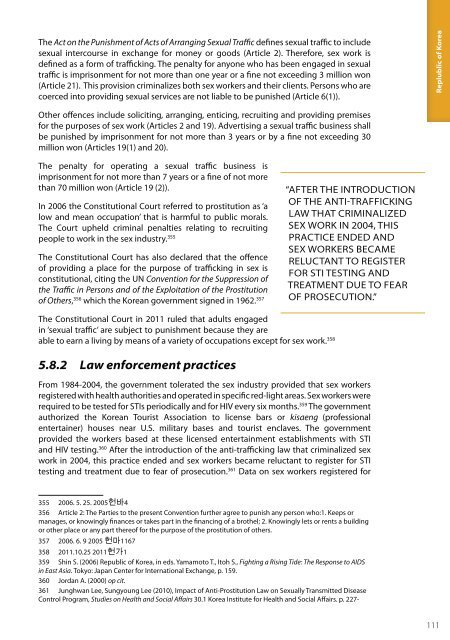SEX WORK AND THE LAW - HIV/AIDS Data Hub
SEX WORK AND THE LAW - HIV/AIDS Data Hub
SEX WORK AND THE LAW - HIV/AIDS Data Hub
You also want an ePaper? Increase the reach of your titles
YUMPU automatically turns print PDFs into web optimized ePapers that Google loves.
The Act on the Punishment of Acts of Arranging Sexual Traffic defines sexual traffic to include<br />
sexual intercourse in exchange for money or goods (Article 2). Therefore, sex work is<br />
defined as a form of trafficking. The penalty for anyone who has been engaged in sexual<br />
traffic is imprisonment for not more than one year or a fine not exceeding 3 million won<br />
(Article 21). This provision criminalizes both sex workers and their clients. Persons who are<br />
coerced into providing sexual services are not liable to be punished (Article 6(1)).<br />
Replublic East Asia of Korea<br />
Other offences include soliciting, arranging, enticing, recruiting and providing premises<br />
for the purposes of sex work (Articles 2 and 19). Advertising a sexual traffic business shall<br />
be punished by imprisonment for not more than 3 years or by a fine not exceeding 30<br />
million won (Articles 19(1) and 20).<br />
The penalty for operating a sexual traffic business is<br />
imprisonment for not more than 7 years or a fine of not more<br />
than 70 million won (Article 19 (2)).<br />
In 2006 the Constitutional Court referred to prostitution as ‘a<br />
low and mean occupation’ that is harmful to public morals.<br />
The Court upheld criminal penalties relating to recruiting<br />
people to work in the sex industry. 355<br />
The Constitutional Court has also declared that the offence<br />
of providing a place for the purpose of trafficking in sex is<br />
constitutional, citing the UN Convention for the Suppression of<br />
the Traffic in Persons and of the Exploitation of the Prostitution<br />
of Others, 356 which the Korean government signed in 1962. 357<br />
“AFTER <strong>THE</strong> INTRODUCTION<br />
OF <strong>THE</strong> ANTI-TRAFFICKING<br />
<strong>LAW</strong> THAT CRIMINALIZED<br />
<strong>SEX</strong> <strong>WORK</strong> IN 2004, THIS<br />
PRACTICE ENDED <strong>AND</strong><br />
<strong>SEX</strong> <strong>WORK</strong>ERS BECAME<br />
RELUCTANT TO REGISTER<br />
FOR STI TESTING <strong>AND</strong><br />
TREATMENT DUE TO FEAR<br />
OF PROSECUTION.”<br />
The Constitutional Court in 2011 ruled that adults engaged<br />
in ‘sexual traffic’ are subject to punishment because they are<br />
able to earn a living by means of a variety of occupations except for sex work. 358<br />
5.8.2 Law enforcement practices<br />
From 1984-2004, the government tolerated the sex industry provided that sex workers<br />
registered with health authorities and operated in specific red-light areas. Sex workers were<br />
required to be tested for STIs periodically and for <strong>HIV</strong> every six months. 359 The government<br />
authorized the Korean Tourist Association to license bars or kisaeng (professional<br />
entertainer) houses near U.S. military bases and tourist enclaves. The government<br />
provided the workers based at these licensed entertainment establishments with STI<br />
and <strong>HIV</strong> testing. 360 After the introduction of the anti-trafficking law that criminalized sex<br />
work in 2004, this practice ended and sex workers became reluctant to register for STI<br />
testing and treatment due to fear of prosecution. 361 <strong>Data</strong> on sex workers registered for<br />
355 2006. 5. 25. 20054<br />
356 Article 2: The Parties to the present Convention further agree to punish any person who:1. Keeps or<br />
manages, or knowingly finances or takes part in the financing of a brothel; 2. Knowingly lets or rents a building<br />
or other place or any part thereof for the purpose of the prostitution of others.<br />
357 2006. 6. 9 2005 1167<br />
358 2011.10.25 20111<br />
359 Shin S. (2006) Republic of Korea, in eds. Yamamoto T., Itoh S., Fighting a Rising Tide: The Response to <strong>AIDS</strong><br />
in East Asia. Tokyo: Japan Center for International Exchange, p. 159.<br />
360 Jordan A. (2000) op cit.<br />
361 Junghwan Lee, Sungyoung Lee (2010), Impact of Anti-Prostitution Law on Sexually Transmitted Disease<br />
Control Program, Studies on Health and Social Affairs 30.1 Korea Institute for Health and Social Affairs. p. 227-<br />
111
















